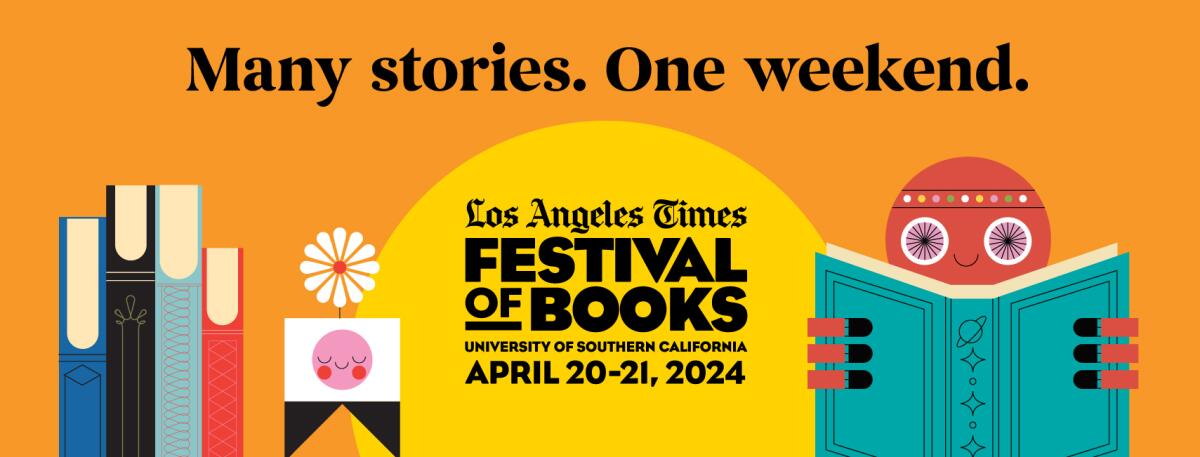You’re reading Book Club
An exclusive look at what we’re reading, book club events and our latest author interviews.
You may occasionally receive promotional content from the Los Angeles Times.
Good morning and welcome back to the L.A. Times Book Club newsletter.
For the next few editions of the newsletter, you’ll be hearing directly from authors. Next up …
I’m Mark Athitakis, a frequent contributor to The Times’ books coverage.
So, have you heard the story about the L.A. baseball superstar and the gambling scandal?
When the MLB season starts, I usually sort through a mental list of favorite baseball books. But as I’ve followed the saga of big-ticket Dodgers slugger Shohei Ohtani, whose Japanese translator, Ippei Mizuhara, was abruptly fired last month in the wake of accusations of misspent millions on gambling, one book crowded out the rest.
Emily Nemens’ 2020 linked-story collection, “The Cactus League,” turns on the world surrounding Jason Goodyear, a star for the mythical Los Angeles Lions, who keeps an embarrassing, money-draining secret. The book is an excellent glimpse into the off-the-field baseball world, and how outsize personalities (and salaries) can send it off-kilter.
I checked in with Nemens over email about how she’s gearing up for the season, some of her favorite sports writing, and how “The Cactus League” has gone over in Europe. This interview has been edited for length and clarity.
Do you have any thoughts about the current controversy surrounding Ohtani, especially since your book has a subplot that involves big-league baseball and gambling?
My dad, who forwards me baseball news about twice a day (thanks, Dad!), texted as the story broke and asked “Is this life imitating art?” It’s likely more of a Möbius strip. I researched a lot about athlete gambling as I wrote “The Cactus League.” I’m very curious to see how the investigations shake out. And I see some unrealized narrative potential in bookies! Why sit in a casino all night when you can gamble from anywhere?
[Editor’s note: Read The Times’ new story about bookies here: Inside the gambling ring linked to Ohtani — as told by two bettors themselves.]
What’s your routine for keeping up with baseball during the season?
I have lived out of range for my local TV and radio programs for decades, so I’ve settled into a long-term, love-hate relationship with the MLB at Bat app. I go to the Athletic and Defector often, and I fangirl for new pieces by Louisa Thomas (the New Yorker), Dave Zirin (the Nation), and Mitchell S. Jackson (who isn’t exactly a sportswriter, but when he weighs in on sports culture, I’m there).
You’re the sports editor for Stranger’s Guide, a literary journal that focuses on a particular place in each issue. What makes for a great, offbeat sports story?
I find myself drawn to stories about when and how sports can do vital work in community building. You can see this in Niren Tolsi’s piece on cricket in Johannesburg, which charts the sport in one neighborhood to tell a story of immigration and activism there.
How has your novel gone over in Europe, which is not well-known for its baseball culture?
I imagine the response was a bit like when I took the book around Germany, which I did while on a writing/teaching fellowship at the University of Leipzig. At first, Germans were a bit befuddled. I think they thought the novel was a quirky document of Americana. But then we got to talking about the book’s themes: seeking community, unbridled aspiration, economic precarity, the inevitability of aging. There are a lot more universals wedged into “The Cactus League” than first meets the eye.
The L.A. Times Festival of Books has several panels on sports and the outdoors
The Times Book Club author for April is Abraham Verghese, Stanford medical professor and author of the highly-acclaimed epic novel, “The Covenant of Water.” The Book Club discussion will be one of the featured events at the Los Angeles Times Festival of Books, which will run April 20-21 on the USC campus. Ticket packages for these and other special events are available now.
At the L.A. Times Festival of Books, several panels will highlight sports and the outdoors. Many of these events are free, but require tickets in advance. Ticket information is available here.
Game On: Money & Power in Sports
Russ Bengtson, Macaela MacKenzie and Keith O’Brien discuss how big money has influenced modern sports. Dylan Hernandez moderates.
Saturday, April 20, 3:30 p.m.
Hoffman Hall, Edison Auditorium
Read With Rampage and the Los Angeles Rams!
The L.A. Rams mascot reads from his book, “Ride With Rampage,” joined by the Rams cheerleaders.
Sunday, April 21, 10 a.m.
Children’s Stage
Mother Nature: Women and Wilderness
Authors Angie Sijun Lou, Melissa Sevigny, Diane Smith and Karen Tei Yamashita discuss women’s pioneering role in studying the outdoors, from Yellowstone to the Grand Canyon and beyond. Denise Hamilton moderates.
Sunday, April 21, 11 a.m.
Albert and Dana Broccoli Theatre
Ask a Reporter: Under Pressure—Can L.A.’s Biggest Sports Teams Deliver?
Times writers Dylan Hernandez, Ryan Kartje, Bill Plaschke and Sports editor Iliana Limón Romero weigh in on the championship prospects of the Dodgers, Angels and more.
Sunday, April 21, 1:45 p.m.
Mudd Hall 203
Humans vs. Nature: Conflict With the Natural World
From climbing Mount Everest to hiking the Pacific Coast Trail, writers Andrea Lankford, Christina Gerhardt and Will Cockrell discuss exploring the edges of the Earth. The Times’ Thomas Curwen moderates.
Sunday, April 21, 2 p.m.
Albert and Dana Broccoli Theatre
The Week(s) in Books
The biggest and most troubling recent news in the book world is the abrupt closing of Small Press Distribution, the Berkeley-based nonprofit distributor for a raft of independent publishers. SPD had been in the process of streamlining, moving warehouses and raising funds to improve its capacity for print-on-demand and e-book sales. But it ultimately couldn’t make ends meet. “SPD lost hundreds of thousands in grants in the past few years as funders moved away from supporting the arts,” executive director Kent Watson wrote in a statement. More than 400 publishers are now scrambling for alternatives.
One of this week’s winners of the Windham-Campbell Prize, which honors writers working in nonfiction, fiction, poetry and drama, is L.A. novelist Kathleen Scanlan. Scanlan told The Times she found news of the award and $175,000 prize “baffling and wonderful.”
Also in our books pages: Patric Gagne discussed her memoir “Sociopath,”, and bestselling author Don Winslow explained why his latest thriller, “City in Ruins,” is likely his last. Lorraine Berry reviewed Lydia Millet’s nonfiction book on climate change, “We Loved It All,” and Mary Ann Gwinn reviewed Hampton Sides’ “The Wide Wide Sea,” a chronicle of the final voyage of Captain James Cook.
Plus, Bethanne Patrick runs down 10 more books coming out this month.
Bookstore faves

(Mariah Tauger/Los Angeles Times)
Every couple of weeks, we check in with an L.A. bookseller or librarian about what they’re loving. This time: David Kipen, a regular Times contributor and co–founder of the Boyle Heights bilingual indie lending library Libros Schmibros.
On a typical day, who steps in the doors of Libros Schmibros? Who would you like to see drop in more often?
The other night Libros hosted a screening of Desmond Nakano’s fascinating 1979 East L.A. gangster drama “Boulevard Nights” and got a very nice crowd, probably thanks to our listings at the indispensable revivalhouses.com. Other visitors that we’re always happy to see more of include — in descending order of frequency:
- High-school kids, middle-schoolers, little kids and/or whole families;
- People downsizing and looking to donate books about L.A. or film, fine first editions and Spanish-language books;
- Program officers for large foundations; and book-loving, philanthropically minded zillionaires.
You’ve mentioned that you’d like to have an equal balance of English- and Spanish-language titles on Libros Schmibros’ shelves, but that it’s tougher to find Spanish-language titles. What might help?
Here’s the best I can suggest off the top of my head:
- Noisier customer demand.
- More support for international literature in general and the organizations that support it (like Three Percent and Words Without Borders)
- More support for L.A. bookstores that somehow make bilingual bookselling look possible, like La Librería, which is about to move into new digs on Adams between La Brea and Crenshaw, and the Libros, which just opened across the street from Lincoln High in Lincoln Heights.
For a few years now you’ve tubthumped for a 21st century Federal Writers’ Project. Do you have any favorite California-related works from FWP 1.0?
My favorite unsung California-related work from FWP 1.0 is the Almanac for Thirty-Niners, a merrily written and illustrated, 128-page, New-Years-Day-to-New-Years-Eve booklet full of then-current 1939 events worth attending, plus countless uproarious Bay Area historical miscellaneousness. It even contains the following very good doggerel by a witty FWP staffer, the novelist and San Francisco historian Miriam Allen deFord:
If you want to be liked in San Francisco,
Remember not to call it “Frisco.”
If you’d rather not arouse our ire,
Remember the earthquake was “the fire.”
If you want to earn our friendliness,
Remember to knock Los Angeles.
